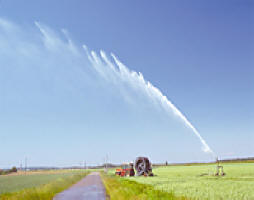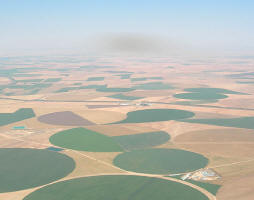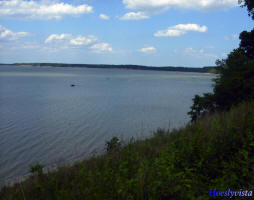 EU targets water as foreign policy tool
EU targets water as foreign policy tool
Water management is climbing the agenda in EU foreign policy and internal security plans, making up a large part of Europe's new thrust to engage with Central Asia states, soothe tensions in the Middle East and cement conflict resolution in the Western Balkans. The EU's recent blueprint for a new Central Asia policy lists "environment" and "water management" as a top priority in the effort to bring "security and good governance" to the region creating "a ring of well-governed countries to the east of the European Union."
The commission "attaches great importance to the issue of water in the occupied Palestinian territories in the framework of the resolution of the conflict" one EU official told EUobserver, with Brussels helping support water-access talks between Israel, Jordan and Palestine through the so-called EXACT regional forum since 1995.
The EU contributed $30 million to the building of a new World Bank waste-water plant in Beit Lahia, Gaza, to help get rid of open, foetid lakes that act as breeding grounds for parasites and spread disease among local children. Construction is to begin this year and last until 2009 due to "extremely difficult circumstances" that have already seen several major US-funded waste management projects in the West Bank put on hold.
At the same time, Turkey's ongoing construction of the Ilisu dam on the Tigris river - using European construction firms and part-financed by private European banks - could degrade water supply in downstream Syria and has already angered Kurds in southeast Turkey over plans to flood the ancient Kurdish town of Hasankyef.
In south Lebanon, water is still scarce after the war between Israel and Hezbollah in summer 2006. And the water situation in the region is set to get worse, with a major World Bank report published in Cairo on 11 March predicting that per capita water availability in the Middle East and North Africa will go down by 50 percent by 2050 due to bad water management - not climate change.
In the Western Balkans, the EU is also working on humble water projects in parallel to high-level UN diplomacy and EU enlargement mechanisms to find ways for ethnic Serbs and Albanians to live together after the bloody wars of the 1990s, with Kosovo seeing a series of bombings, shootings and violent protests even in recent months.
In the next 12 months €1.4 million of EU money will build new drinking water and sewage pipes for the villages of Kqiq, Firaja, Dushkaja and Skenderbeu in Kosovo. Last December €100,000 built new offices for the Regional Water Company in Mitrovica, with €60 million of EU aid spent on water and environment projects in Kosovo since 2000.
The sensitivity of water in the Western Balkans is clear from the history books: in 1990 Serb forces cut off water supplies in the siege of Sarajevo in Bosnia; in 1999 Serb forces cut off water to Pristina and threw Albanian corpses into wells to spread disease. The same year NATO jets hit Belgrade water supplies.
Water has also been used as an instrument of terror inside the EU itself in recent years, with EU water facilities falling under the scope of the European Programme for Critical Infrastructure Protection (EPCIP) launched last December in the wake of the 9/11 terrorist attacks in New York and Washington.
The scheme aims at creating emergency plans and risk monitoring groups to prevent attacks such as the plot in 2002 by four Moroccan citizens to pour cyanide-type chemicals into Rome's water supply or a 2000 incident that saw French factory workers pour 5,000 litres of sulphuric acid into the Meuse river as part of a strike.
A tender for €3 million worth of EPCIP pilot programmes for 2007 will close at the end of March, with EU states set to draw up formal lists of "critical" facilities in 2009 or 2010. "The commission and the member states agree on the importance of the water sector and relevant work is already being undertaken," an EU official working on EPCIP said.
| Contact information |
Alexandre Dechaumont, EUobserver
(email: ad@euobs.com) Phone: +32 486 339 701 |
|---|---|
| News type | Inbrief |
| File link |
http://euobserver.com/875/23634 |
| Source of information | Euobserver.com |
| Keyword(s) | EXACT |
| Subject(s) | DRINKING WATER AND SANITATION : COMMON PROCESSES OF PURIFICATION AND TREATMENT , FINANCE-ECONOMY , INFRASTRUCTURES , POLICY-WATER POLICY AND WATER MANAGEMENT , PREVENTION AND NUISANCES POLLUTION , RISKS AND CLIMATOLOGY |
| Relation | http://www.semide.net/initiatives/exact |
| Geographical coverage | EU, Turkey, Palestine, Israel, Lebanon, Albania, Kosovo, Serbia, Bosnia-Herzegovina, Jordan, Syria, Egypt |
| News date | 14/03/2007 |
| Working language(s) | ENGLISH |
 you are not logged in
you are not logged in





